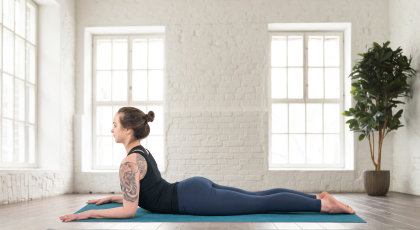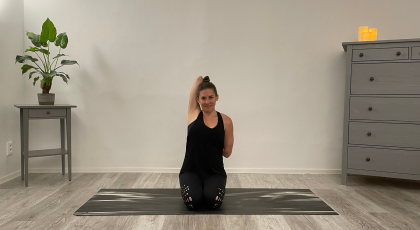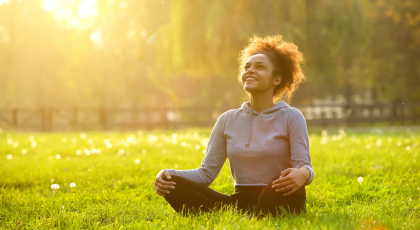View basket (0 items $0.00)

6 Yogic Principles to Help You Manage Holiday Stress
Every year, it’s imminent: holiday stress is incoming. But the holidays should be insightful and memorable times, not something we want to rush to “get over.” It is possible to manage holiday stress, and there are few better philosophies or practices to take on this monumental task than yoga.
Yogic principles offer insight into our true nature, which is easy to forget when we get caught up in the holiday rush to finish ticking off everything on our to-do lists. And yogic practices can provide solace and calm in an otherwise turbulent and busy world.
Manage Holiday Stress With These 6 Yogic Principles and Practices
Unroll your yoga mat as a sanctuary to navigate the stressful holiday season this year. You’ll absolutely thank yourself afterward.
1. Sthira Sukha
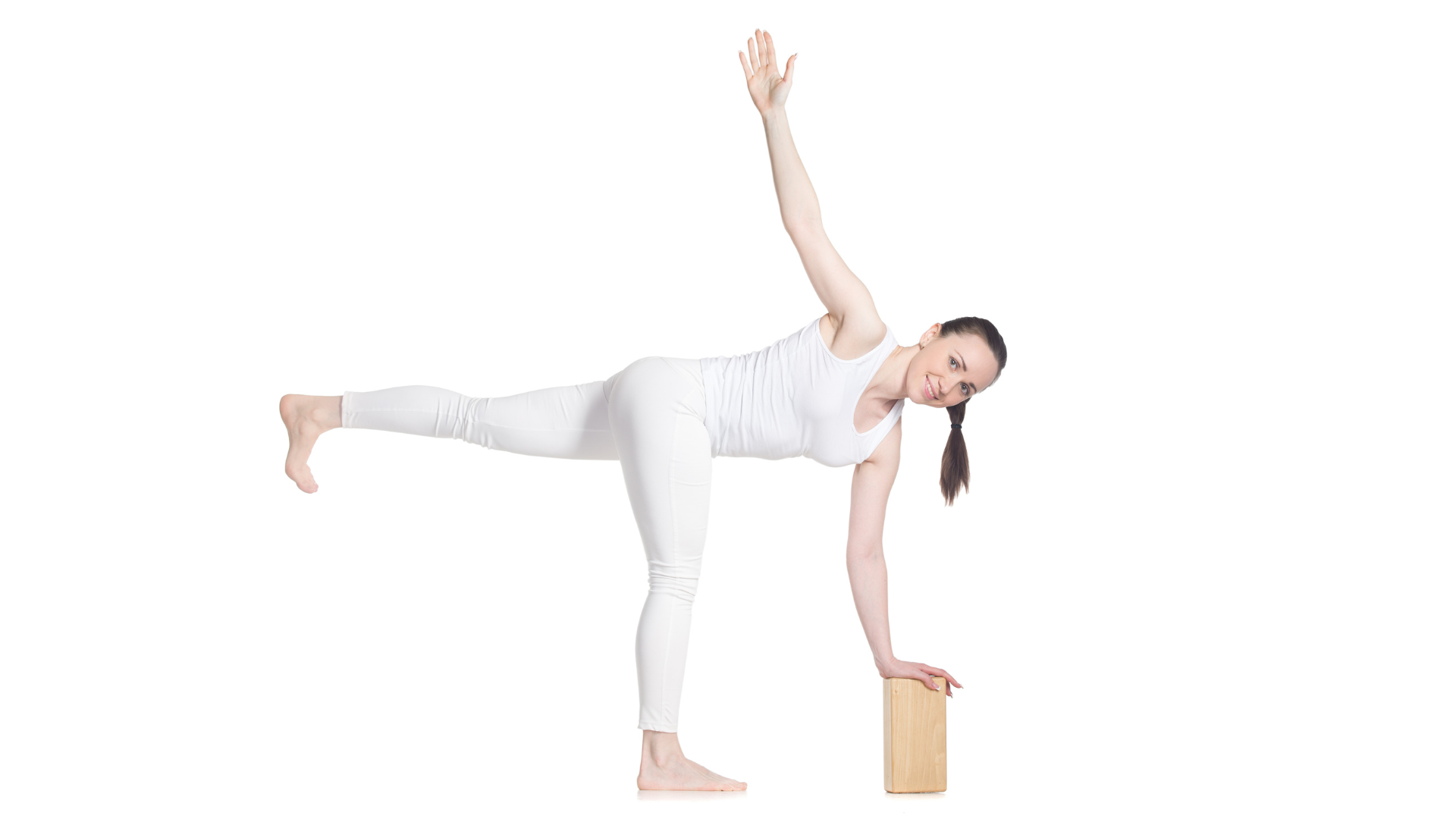 Sthira Sukha is a yogic principle that stems from Patanjali’s Yoga Sutras. Sthira refers to stability and effort. Sukha refers to ease and comfort. When combined, Sthira Sukha refers to a perfect balance between effort and ease.
Sthira Sukha is a yogic principle that stems from Patanjali’s Yoga Sutras. Sthira refers to stability and effort. Sukha refers to ease and comfort. When combined, Sthira Sukha refers to a perfect balance between effort and ease.
Often, when we’re stressed, we focus entirely on effort. We feel we have no time for ease because we are overwhelmed by our busyness. But the trick is to find the balance between effort and ease.
When we put forward too much effort, we lose balance and create stress. If we can allow for ease to also mingle in with the effort, then suddenly, everything becomes more effortless. We find balance. And nothing helps to manage stress better than balance.
2. Svadhyaya
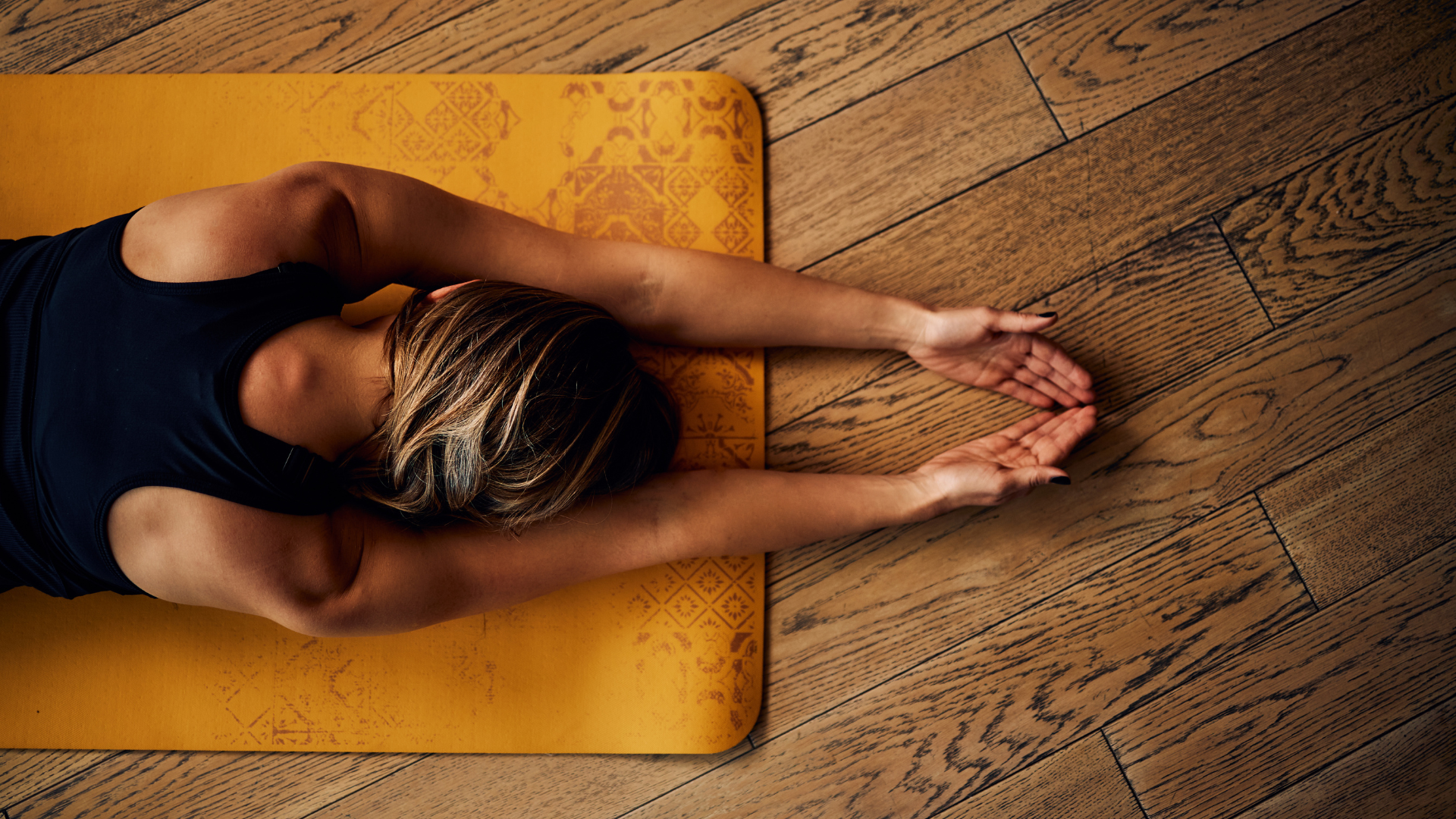 The holidays are an introspective time. We can reflect on the previous year. We could reflect on our childhoods or look forward to how we hope the new year will be. Maybe we remember those who are no longer with us, celebrate the beauty of family or mourn the loss of one.
The holidays are an introspective time. We can reflect on the previous year. We could reflect on our childhoods or look forward to how we hope the new year will be. Maybe we remember those who are no longer with us, celebrate the beauty of family or mourn the loss of one.
The holidays bring up different things for everyone, but we can universally take this time to reflect inwardly and practice Svadhyaya. Svadhyaya is the practice of self-study. This can be practiced by simply spending time alone, sitting in deep meditation, or reflecting on the person you are or who you would like to be.
We can better manage holiday stress by shifting our focus from an externally-driven world of buying gifts and succumbing to commercialism to an inward reflection.
3. Seva
 The holidays are often a reminder of all the abundance that we have. Many practice gratitude during this time period. But they are also a poignant reminder of all those who do not have. Thus, there’s no better time of year to practice Seva, or selfless service, than during the holiday season.
The holidays are often a reminder of all the abundance that we have. Many practice gratitude during this time period. But they are also a poignant reminder of all those who do not have. Thus, there’s no better time of year to practice Seva, or selfless service, than during the holiday season.
Nothing will put your stress into better perspective than to help those who have far less. Maybe you’d like to donate to a worthy charity or volunteer at your local food bank or spend time spreading cheer in a nearby hospital.
Nothing embodies the holiday season and yogic philosophy all at once better than practicing Seva.
4. Sama Vritti Pranayama
 Of course, no matter how much you may try to philosophize your thoughts, stress (including holiday stress) is a very real and embodied experience. Sometimes, you just need physical practices to help manage your stress levels.
Of course, no matter how much you may try to philosophize your thoughts, stress (including holiday stress) is a very real and embodied experience. Sometimes, you just need physical practices to help manage your stress levels.
Sama Vritti is a yogic breath practice that means equal fluctuations. It is intended to draw your awareness to your breath and equalize its length. And it’s practiced very simply. All you need to do is relax in a quiet environment and a comfortable position. And then draw all of your attention to your breath.
-
Inhale for a count of four and exhale for a count of four. Equalize the length of each breath. You could continue with a count of four or increase the count if you prefer.
-
You could also inhale for a count of four. Pause at the top of your inhalation for a count of four. Exhale for a count of four. And pause at the bottom of your exhalation for a count of four.
-
Find the breathing pattern that feels the most relaxing to you, and continue to breathe in this way for as long as you’d like.
5. Pratyahara
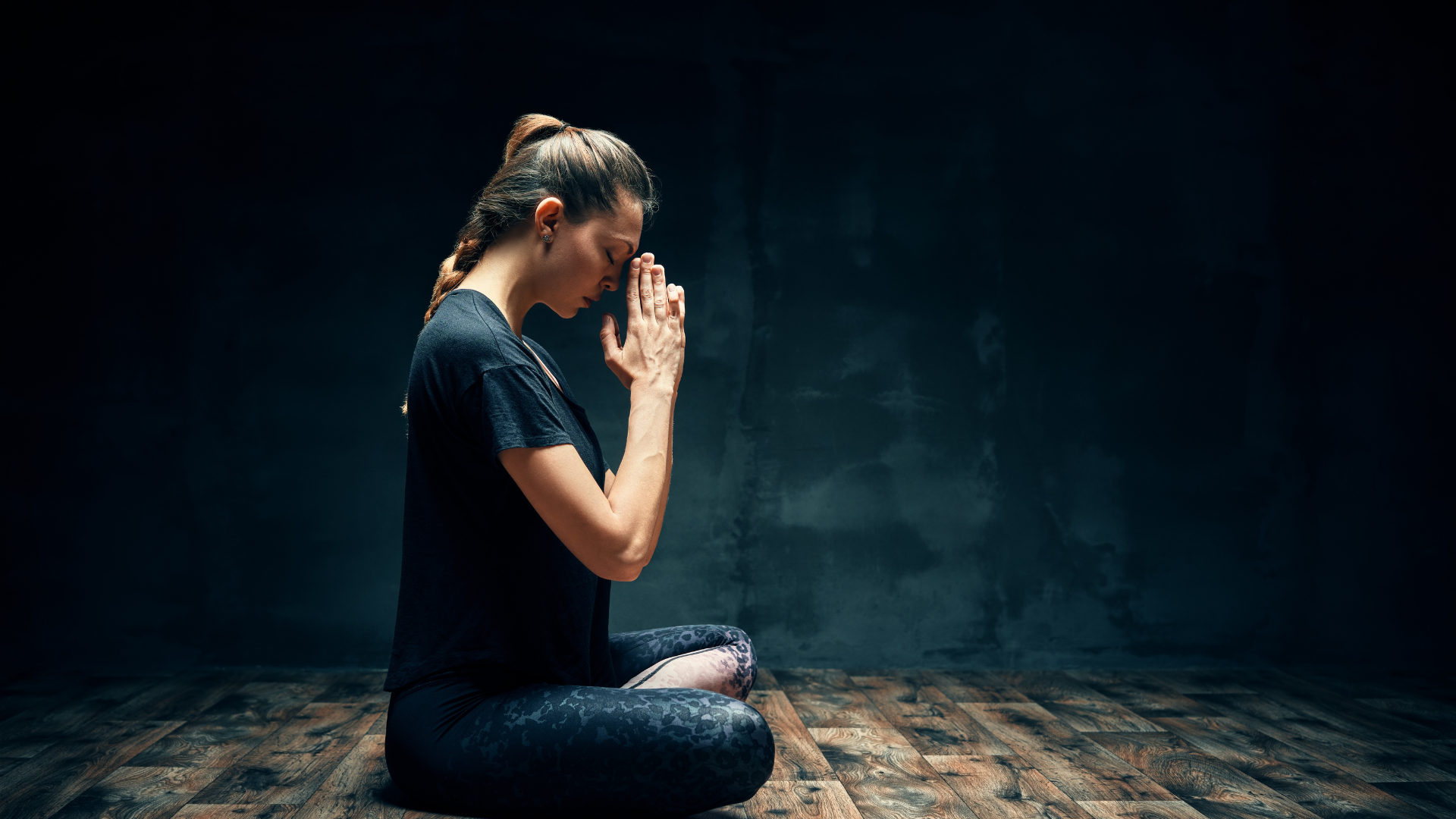 Pratyahara means withdrawal of the senses. And sometimes, when life gets too overwhelming (especially during the busy holiday season), we’d all like to dig our heads into a hole in the ground.
Pratyahara means withdrawal of the senses. And sometimes, when life gets too overwhelming (especially during the busy holiday season), we’d all like to dig our heads into a hole in the ground.
In yogic philosophy, this is actually encouraged—in a way. We experience the world through our senses, and our senses are constantly bombarded by the outside world (bright lights, loud noises, hot or cold temperatures, etc.).
So to draw our awareness deeper within, yogic philosophy encourages a withdrawal of the outward senses so that we can more closely introspect. This can be especially helpful when we are stressed. We can willingly shut out the outside world and look within to recognize that whatever stressors are currently bothering us are not as important as they may seem.
To practice Pratyahara, you can simply enter a quiet, dark space and bring your attention inside. You can also create a mudra or gesture by closing your eyes and gently pressing your thumbs into your ears and your index fingers over your nostrils to close off your senses.
As you close off your senses, bring your awareness inside and peer into your inner depths. Recognize the importance of what lies below and how inconsequential other stressors may be.
6. Savasana
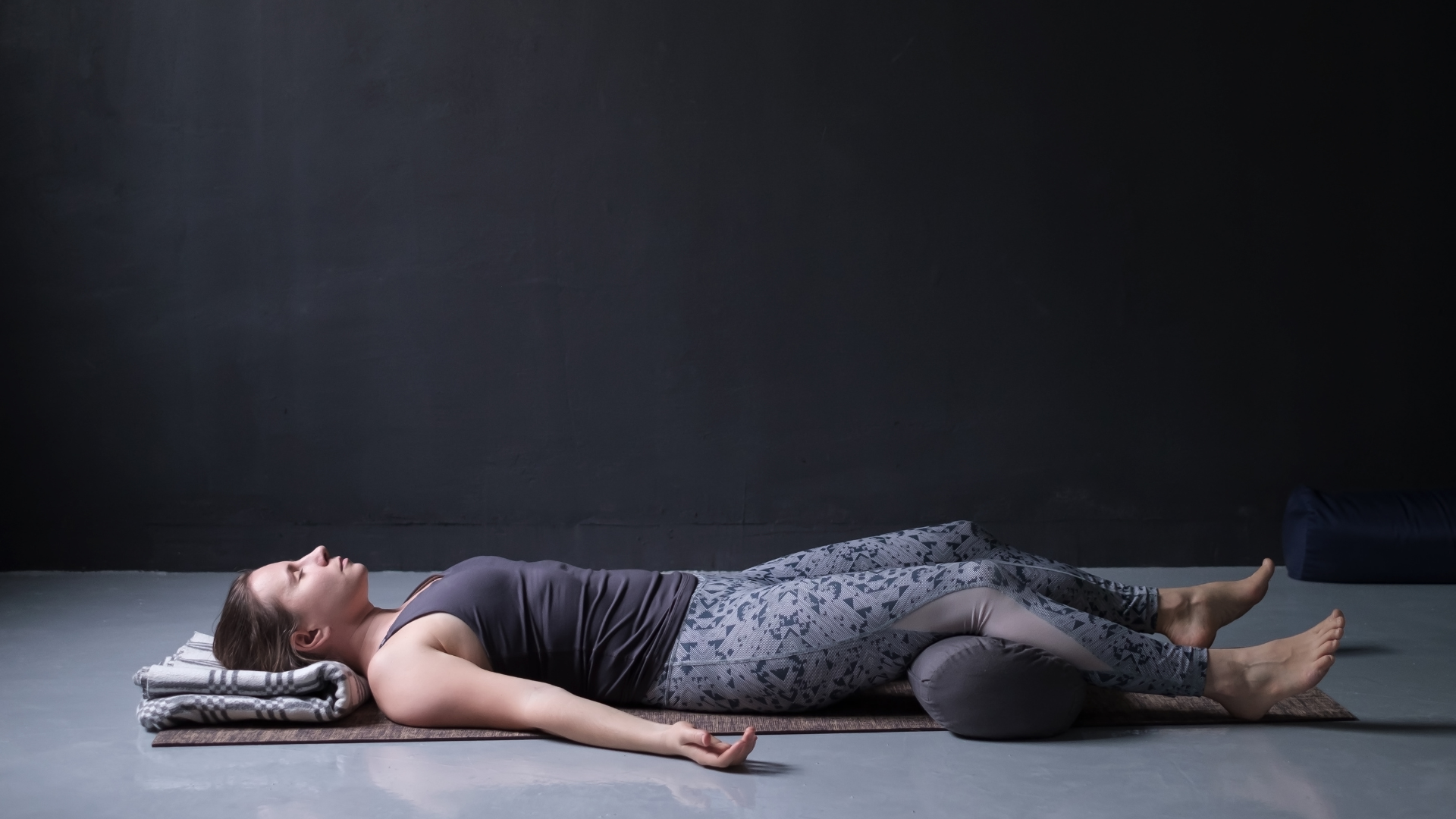 Few practices are as stress-relieving as a simple Relaxation Pose (Savasana). When holiday stress becomes far too much, give yourself permission to take a break.
Few practices are as stress-relieving as a simple Relaxation Pose (Savasana). When holiday stress becomes far too much, give yourself permission to take a break.
Soften and relax as you lie down on your back, close your eyes, and surrender. Give yourself permission to let go so you can easily manage holiday stress.
Have a Stress-Free Holiday Season This Year By Using These Yogic Principles and Practices to Manage Holiday Stress
May your yoga practice guide you now more than ever, especially in overcoming stress and savoring the beauty of the holiday season.
 Leah Sugerman is a yoga teacher, writer, and passionate world traveler. An eternally grateful student, she has trained in countless schools and traditions of the practice. She teaches a fusion of the styles she has studied, emphasizing breath, alignment, and anatomical integrity. Leah teaches workshops, retreats, and trainings, both internationally and online. For more information, visit www.leahsugerman.com.
Leah Sugerman is a yoga teacher, writer, and passionate world traveler. An eternally grateful student, she has trained in countless schools and traditions of the practice. She teaches a fusion of the styles she has studied, emphasizing breath, alignment, and anatomical integrity. Leah teaches workshops, retreats, and trainings, both internationally and online. For more information, visit www.leahsugerman.com.
Featured Courses





